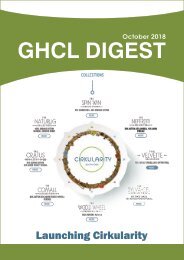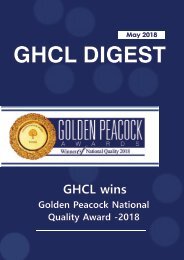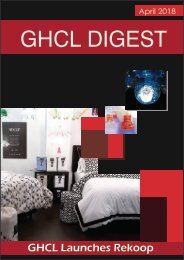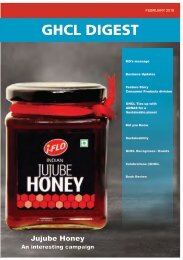GHCL Digest JUNE 2018
GHCL Digest JUNE 2018
GHCL Digest JUNE 2018
You also want an ePaper? Increase the reach of your titles
YUMPU automatically turns print PDFs into web optimized ePapers that Google loves.
i-FLO Product<br />
Honey –nature's original sweetener<br />
Honey –nature's original sweetener, is a natural source of energy that has a unique combina on of<br />
nutri onal, therapeu c and healing quali es.<br />
Honey has long been used as a replacement to sugar. It is widely used in the cosme c and medicine<br />
industries across the world. Honey finds its men on in several religious texts such as the Hindu<br />
scriptures, the Jewish Tanakh and the Holy Quran along with Buddhism and Chris anity. Ayurveda,<br />
India's ancient system of medicine, has highlighted the benefits of honey for centuries. Across cultures,<br />
honey is termed as 'The Nectar of the Gods'.<br />
People of all age group consume honey. With the growing consciousness surrounding health, the<br />
demand of honey has seen a great rise. Consumers seeking healthier and natural op ons of sweetener<br />
turn to honey which is a natural energy booster too.<br />
Honey is available in our natural forests and is also collected through apiaries all over the country. Being<br />
a 100% natural product, derived out of nectar from flowers and made by honey bees, it has zero fat and<br />
zero cholesterol, and ideally suits to the modern-day hec c lifestyle.<br />
To start the produc on and export of honey, the business operator needs to obtain a number of<br />
cer fica ons as this category requires to follow many stringent norms of quality and safety. There are<br />
standards for the composi on, moisture content, fructose, sucrose and glucose percentages,<br />
conduc vity and floral source. All of these need be taken into account in order to maintain and improve<br />
the quality of honey. Business operators have to put forth robust QC procedures, with well-documented<br />
processes that ensure traceability ll the beekeeper's level.<br />
Honey is regulated under the Preven on of Food Adultera on Rules, 1955, the voluntary Bureau of<br />
Indian Standards for ISI mark, and Honey Grading and Marking Rules, 2008, under the Agricultural<br />
Produce (Grading and Marking) Act, 1937, also known as AGMARK.<br />
All of the above define honey as a natural product and lay down standards for its composi on and<br />
quality.<br />
The availability of honey across all seasons adds up to its industry's profit which is moving on a rapid<br />
growth rate. The branded honey market is growing at a compound annual growth rate (CAGR) of 10 per<br />
cent, with a current market size of Rs.700 crores. India produces 7000 million tons of honey, out of<br />
which 50 per cent is exported annually. As per industry es mates, it is believed that the size of both the<br />
branded and unbranded segments in the Indian market is approximately Rs.2000 crore. Within this, the<br />
share of branded honey is approximately Rs.700-800 crore. There has been a steady surge in the organic<br />
honey market. The industry is s ll considered niche but the product is gradually finding its place in the<br />
mass consumers' household.<br />
i-FLO Honey is a pure and one of the best in terms of quality. We have a strong sourcing point along with<br />
huge global volumes, hence we do not compromise on the quality and purity of the product.<br />
June <strong>2018</strong><br />
10











